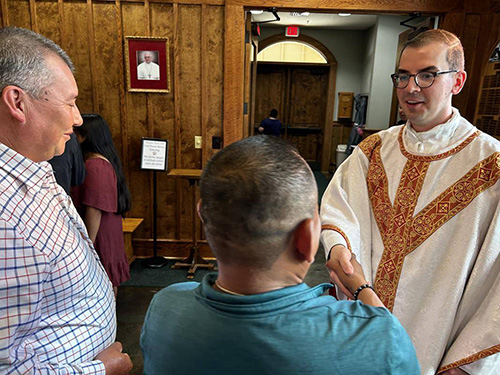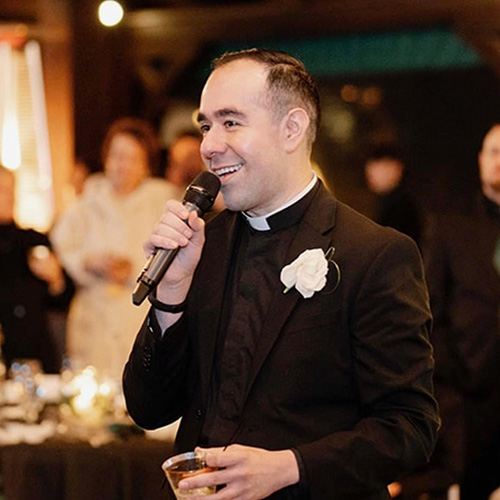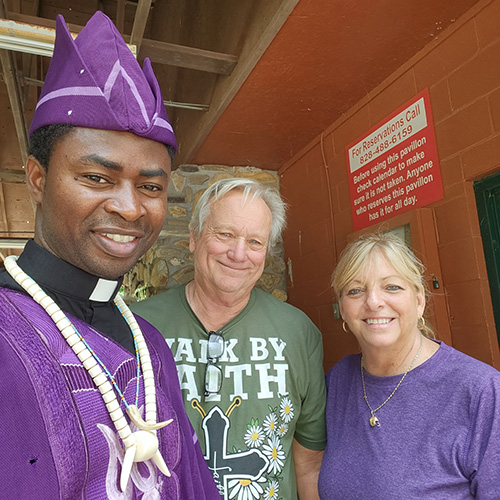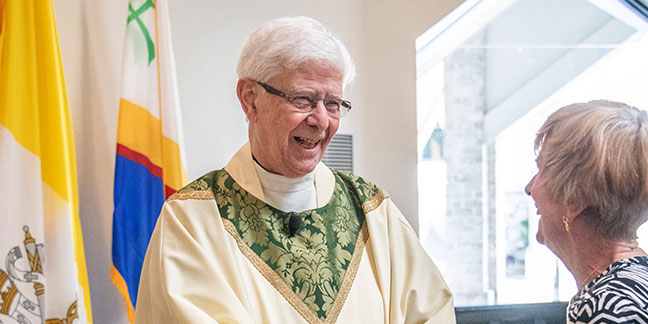 GREENSBORO — Churches across the Diocese of Charlotte will take up a special collection Sept. 24-25 to support the diocese’s retired priests including Father Robert “Bob” Ferris – who at 84 is still on the road most weekends saying Mass and providing pastoral support at Catholic churches across western North Carolina.
GREENSBORO — Churches across the Diocese of Charlotte will take up a special collection Sept. 24-25 to support the diocese’s retired priests including Father Robert “Bob” Ferris – who at 84 is still on the road most weekends saying Mass and providing pastoral support at Catholic churches across western North Carolina.
Known affectionately as “Padre Dad,” because he became a priest late in life after having a family, Father Ferris traverses the diocese, stepping in for busy priests called away or in need of time off. He regularly celebrates Mass at Our Lady of Grace Church near his home in Greensboro.
Like many retired priests, Father Ferris fills his days providing spiritual direction, leading mini retreats at parishes, speaking to groups, and assisting at Cursillo retreats. He also makes house calls to hear confessions and bring homebound parishioners Holy Communion. Occasionally, he celebrates Mass at the Pennybyrn retirement community in High Point.
“I don’t want to stop until God calls me home!” Father Ferris says.
The diocese needs to raise $1.7 million in this year’s collection for retired priests, to stay on track to provide future pension income and supplemental retiree health insurance for the 125 priests serving the Church in western North Carolina. Parishioner gifts are the primary source of funding and the annual amount needed is calculated by actuaries factoring in inflation and growth of the diocese’s pension and health trusts. The funds also help support the diocese’s 36 retired priests.
Serving as a priest for 22 years, Father Ferris was ordained in 2001, many years after his beloved wife Mary Kay passed away. He has six grown children, 10 grandchildren and a great-grandchild due in February.
The former pastor of St. Aloysius Parish in Hickory, Father Ferris officially retired in 2014 but finds himself regularly assisting at parishes throughout the Triad and across western North Carolina.
“When I was at St. Aloysius Parish, I got tired, as I was up early and out late a lot,” Father Ferris says. “But I never wanted to stop administrating the sacraments upon retirement.”
Over the past eight years since he retired, he has been able to set more of his own schedule and get a bit more rest. He also spends more quality time with his family.
“My grandkids know me now,” he says. “I can celebrate Mass with them, attend birthday parties and family celebrations.”
Still, Father Ferris wants to continue serving the diocese as long as God allows. “I tell Him, ‘Lord, you give me the good health and the people, and I’ll work for you.’”
In a letter to the faithful, Bishop Peter Jugis urges parishioners to support the annual Priests’ Retirement Benefits Collection, noting that retired priests like Father Ferris, “remain ‘In Service to All,’ and now we can respond with gratitude.”
— SueAnn Howell
Priests’ Retirement Benefits Collection facts
- The Priests’ Retirement Benefits Collection provides for the future pension income and retiree health benefits of the 125 priests serving the Church in western North Carolina, as well as 36 retired priests.
- The 2022 goal is $1.7 million.
- Contributions will help fund the diocese’s Priests Pension Trust and Retired Priests Health Plan Trust, as well as retirement programs of religious orders and other dioceses that are providing priests to serve in parishes of the Diocese of Charlotte.
- For parishioners unable to attend Mass the weekend of Sept. 24-25, a gift can be made by mail or online. Please mail checks to Priests’ Retirement Fund, Diocese of Charlotte, 1123 S. Church St., Charlotte, N.C., 28203. Online, please go to your parish website if it offers online giving or visit www.charlottediocese.org/donate, then click “Priests’ Retirement & Benefits Collection.” Your gift will be credited to your parish.
Bishop Michael Martin will formally install these first-time pastors during special Masses in the coming weeks
Father Jacob Mlakar
Leading others to Jesus through sacraments, wisdom of the saints
 Father Jacob Mlakar has been appointed to pastor both St. Francis of Assisi Parish in Jefferson and St. Frances of Rome Mission in Sparta.Tuesday, Oct. 22: Father Jacob Mlakar becomes pastor of St. Francis of Assisi Parish and St. Frances of Rome Mission
Father Jacob Mlakar has been appointed to pastor both St. Francis of Assisi Parish in Jefferson and St. Frances of Rome Mission in Sparta.Tuesday, Oct. 22: Father Jacob Mlakar becomes pastor of St. Francis of Assisi Parish and St. Frances of Rome Mission
JEFFERSON — Father Jacob Mlakar was up late at Casa Santa Maria, a home for American priests studying in Rome, when he received the call that surprised him.
Monsignor Patrick Winslow, vicar general and chancellor of the Diocese of Charlotte, told him he’d been appointed to pastor St. Francis of Assisi Parish in Jefferson and St. Frances of Rome Mission in Sparta.
“I was surprised and excited to be made pastor. … It was a wonderful surprise,” said Father Mlakar, who had expected to remain an assistant pastor for a year or two more. “It gave me something to look forward to and made me all the more motivated to finish my studies.”
While it might seem daunting for a first-time pastor to take on two churches instead of one, Father Mlakar’s few months have proven a breath of fresh air for him.
“There’s a learning curve, but I am happy to serve the populations of the parish and the mission,” said the Ohio native, who earned his theology degree from the Pontifical University of St. Thomas.
“Being in Rome studying for a year, I didn’t hear many confessions. I didn’t do any anointings. Being back here, I was able to get back into those things because of my previous parish experience.”
After his ordination in 2020, Father Mlakar served as parochial vicar at St. Vincent de Paul Parish in Charlotte for a year and for two years at Holy Cross Parish in Kernersville before moving to Rome – an experience he says equipped him in both spiritual and practical ways for his ministry.
He recently shared observations from his few months as a pastor.
CNH: What does it mean to you to become a pastor?
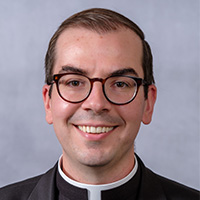 Father MlakarFather Mlakar: It means a great deal. This is what I’ve wanted to be, especially to be pastor in the mountains. … There’s a lot of new things I’m learning, but I am definitely enjoying being back in parish ministry after earning my licentiate and being able to take more of a leadership role in the parish.
Father MlakarFather Mlakar: It means a great deal. This is what I’ve wanted to be, especially to be pastor in the mountains. … There’s a lot of new things I’m learning, but I am definitely enjoying being back in parish ministry after earning my licentiate and being able to take more of a leadership role in the parish.
CNH: How did your studies this past year prepare you for your pastor role?
Father Mlakar: The licentiate and spiritual theology is all about the spiritual life, especially studying the writings of the saints. It was (taught) in the Dominican tradition, but we studied all the great spiritual writers.
That’s been extremely helpful in my preaching and the way I relate to people and the advice I give on the spiritual life. It’s a very good theological degree but also it is very practical for a parish priest to be able to get up and draw from the great wisdom of our spiritual tradition.
CNH: How have your first months as pastor been going?
Father Mlakar: They’ve definitely been busy, starting with moving into a new house and trying to keep a tidy house and clean office, and yet keep up with all the parish needs. I’ve been meeting with everyone to talk about the programs that are going on like faith formation, O.C.I.A. and the parish councils. They want to tell me about the good work they’re doing and see how I can support them. It’s a great example of people coming together and keeping the life of the parish flourishing.
We also began planning for the big liturgies like the Holy Hour, Vespers and Mass celebrating the 10th anniversary of our new church, plus the parish picnic afterward. A lot of it has been being there for the daily worship of God as I start to get into some of the bigger administrative responsibilities.
CNH: How have your years as a parochial vicar helped prepare you to be a pastor?
Father Mlakar: Gaining better familiarity with what I would call the human experience, especially meeting with people and ministering to them in their needs. That’s helped with the normal pastoral experience, being familiar with the sacraments.
Drawing on my experience as a parochial vicar, I was able to return to some of those things and build off routines and schedules.
CNH: What is your favorite part of being a priest?
Father Mlakar: Definitely visiting the sick and anointing the sick, because I was ordained during COVID, and when I was at St. Vincent de Paul, we were the go-to parish for one of the big hospitals in that area. At a time when many people weren’t able to get into the hospital to visit the sick, they actually were calling us pretty frequently to visit and administer the sacraments. That is a sacrament that’s always touching to administer, especially to those who are receiving it for the last time.
CNH: Can you share a part of your own spiritual life?
Father Mlakar: The everyday pastoral tasks up here involve a lot of driving. St. Frances of Rome Mission is about a 40-minute drive from St. Francis Parish in Jefferson. I’ve been on the road a lot, so I’ve had to learn how to use that time for reflection and renewal for prayer instead of listening to a podcast or something like that.
CNH: What are you reading?
Father Mlakar: During these first months as a pastor, I’ve developed a devotion to St. Gregory the Great. He has a book on pastoral care, so he has been my favorite saint recently. He was a pope in the early Middle Ages, and he wrote the go-to book for pastors even way back then, and it’s been used throughout Church history, so that’s been my spiritual reading, and he’s been my saint that I’ve been praying to and thinking about a lot.
— Annie Ferguson
Father Michael Carlson
Growing a pastor’s heart
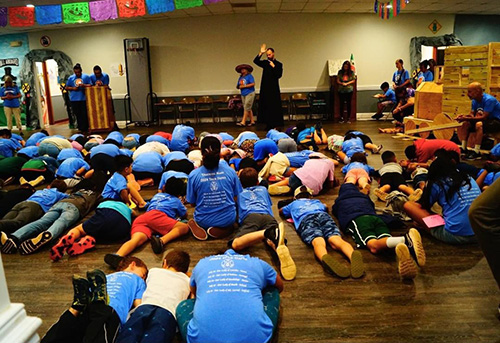 Father Michael Carlson will continue his roles as promoter of justice for the diocese’s tribunal and as chaplain of the local chapter of Courage International while serving as pastor of St. Dorothy Parish in Lincolnton
Father Michael Carlson will continue his roles as promoter of justice for the diocese’s tribunal and as chaplain of the local chapter of Courage International while serving as pastor of St. Dorothy Parish in Lincolnton
Nov. 2: Father Michael Carlson becomes spiritual leader of St. Dorothy Parish
LINCOLNTON — It didn’t take long for Father Michael Carlson to follow the promptings of the Blessed Mother in his first assignment as pastor.
Soon after he arrived as pastor of St. Dorothy Parish in Lincolnton, he had the opportunity to bless and enroll 104 children wearing brown scapulars – a sacramental garment worn by those devoted to Mary, the Mother of God, and the spirituality of the Carmelite Order.
“It’s astonishing to have so many,” Father Carlson says, noting the children were part of a record number attending the parish’s annual Catholic Kidz Camp. “It’s a very young parish with a lot of young families. …
The parishioners are very well formed – and that’s something I’d like to continue.”
Father Carlson’s own personal devotion to the brown scapular and consecration to Our Lady is what led him to enter seminary, he said.
Ordained in 2019 by Bishop Peter Jugis, Father Carlson – a California native – received his theology degree from the Pontifical North American College in Rome, where he also obtained a canon law degree in 2021.
While serving at St. Dorothy, he will also continue his roles as promoter of justice for the diocese’s tribunal and as chaplain of the local chapter of Courage International, a support and spiritual guidance group for people experiencing same-sex attraction.
Father Carlson’s five years as a parochial vicar included assignments at Our Lady of Grace Parish in Greensboro and St. Mark Parish in Huntersville.
He reflects here on this important moment in his ministry.
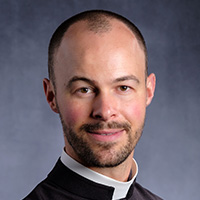 Father CarlsonCNH: What does it mean to you to become a pastor?
Father CarlsonCNH: What does it mean to you to become a pastor?
Father Carlson: It’s a step up in responsibility. I see being a pastor as an elevation of the priest’s role as a father. You really become the father of your community and, with that, responsibility (for) all of their spiritual needs in so many ways falls on your shoulders as far as the sacraments and preaching. During the first time I drove into Lincolnton after knowing that I’d be the pastor, it was amazing the change that came over me. I felt this real responsibility … a bit of this fatherly watchfulness over all the people in Lincolnton. Then I also felt a real weight of responsibility of needing to do something for each soul within this territory.
CNH: How have your first weeks been going?
Father Carlson: The first weekend was kind of a celebration and people are so excited, but both on the part of the priest and on the part of the people, you’re mourning. You’re mourning your former assignment and just all the people, the relationships, the time and energy and all the prayers said, and they’re mourning their former pastor. It’s also a time of celebration because you know we’ll be at peace together in the most important moments in terms of Mass and the sacraments.
We’ll be spending a lot of time together. I’ve really been thinking a lot about that family dynamic because, especially with a smaller parish, it really does function in many ways like a family. That can be a challenge but also a beautiful and powerful thing.
CNH: How have your parishioners welcomed you?
Father Carlson: I’ve been overwhelmed with how many people have reached out from St. Dorothy’s to offer assistance, help or care or milk – really anything that’s needed. I’ve never had so many people offer to move boxes and just help move in. Also, I don’t think I’ve been hugged as many times as I have in these past few weeks!
CNH: What are you looking forward to most as pastor?
Father Carlson: Being a preacher and a teacher of the faith and really embracing and growing into those roles is really exciting.
CNH: How have your years as a parochial vicar helped prepare you to be a pastor?
Father Carlson: The most important thing I learned is to always pray. I’ve started something where even before I go to somebody’s home or certainly if I’m going to administer anointing of the sick to someone, I’ll pray the whole time or at least pray a little bit before I go. It’s something I picked up from almost every priest that I’ve spent time with whether for summer assignment or as parochial vicar.
That’ll be my lasting memory of our former Bishop Jugis. Whenever I met with him one-on-one for something, he would always in the meeting prayerfully discern something. I would experience that in a very powerful way, and it’s something that I don’t ever want to lose sight of – what the goal really is: the salvation of souls.
CNH: What are you reading?
Father Carlson: Right now, I’m reading “The Brothers Karamazov,” and for my spiritual reading “The Mystical Evolution” by a Spanish Dominican friar. It sounds kind of fancy but, really, it’s just about how do we really put on Christ to the degree that it’s really Him living through us? I want to slowly go through it this year and try to really absorb and implement what’s in those pages.
CNH: How has the example of other priests helped you become the pastor you are today?
Father Carlson: I’ve been involved with many great priests where they really do sacrifice for people, and they care about them. As a parent oftentimes, you’re thinking about your children. Well, priests think about their parishioners, the things going on in their lives, and that’s not something I’ve created but that is something I’ve received from the priests I’ve been around. In my experience, it’s been a great group of men who really do just want to bring Christ to their people.
— Annie Ferguson
Father Alfonso Gamez
‘Doing God’s will’
 Father Alfonso Gamez, the new pastor at St. Francis of Assisi Parish, gives a best man speech at a friend’s recent wedding.
Father Alfonso Gamez, the new pastor at St. Francis of Assisi Parish, gives a best man speech at a friend’s recent wedding.
Nov. 3: Father Gamez becomes pastor at St. Francis of Assisi
LENOIR — Father Alfonso Gamez stepped into his new role as pastor at St. Francis of Assisi Parish in July and says he’s already learning new ways to relate to people and rely on God to expand his ministry.
Ordained in 2019, Father Gamez was celebrating the fifth anniversary of his priesthood when he learned he’d soon become a pastor. His formal installation Mass will be held at 10 a.m. on Nov. 3.
His first assignment as a priest for the Diocese of Charlotte was serving as parochial vicar at St. Mark Parish in Huntersville in 2019 – an experience he values for having given him the chance both to serve a large parish and to learn how to adapt to a crisis: COVID-19. He then worked as parochial vicar at Our Lady of Mercy Parish in Winston-Salem and St. Vincent de Paul Church in Charlotte.
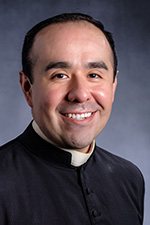 Father GamezFather Gamez talked about his experience as a new pastor recently, in reflections here:
Father GamezFather Gamez talked about his experience as a new pastor recently, in reflections here:
CNH: What does it mean to you to become a pastor?
Father Gamez: My life as a pastor began on July 9, and this is something that I really wanted. I gained a lot of experience from my previous assignments and had become used to the basics of the priesthood, and I had a deeper desire to have a little more creativity in decision-making and working with parishioners. This is just a next step in my growth as a priest.
CNH: How have your first few weeks as a pastor been going?
Father Gamez: There have been challenges because shortly after I became pastor, in the same week I got the flu, and then a big tree in front of the rectory got struck by lightning and had to be cut down. I was telling a friend that I could feel the experience of growth because I was having so many experiences not familiar to me in terms of administration and decision-making. I feel God is allowing me to grow through the work I’ve been doing. Also, the parishioners here are great – super hospitable and super kind. I was assigned here in the summer of 2015 while I was a seminarian, so I knew some of the parishioners here already. That has made the transition a smoother landing.
I also am grateful I got to talk to Bishop Martin about my new role. I talked to him personally about the challenges I face, and there is a great peace that I received with him telling me to move forward with things. I feel like I’m doing God’s will with his encouragement. I feel so much peace, because I know that this is not my work – it’s all for the glory of God.
CNH: What have you learned so far?
Father Gamez: I’ve learned to listen and be honest and tell people all the things I don’t know and depend on their experience to help me learn. There’s a huge dynamic of trust-building in the beginning, where they need to grow their trust in me, and I grow to trust them. And I’m seeing that trust evolving. Also I’m learning that people in the parish want direction to see where the parish is going, where we should be putting our energy and time to be good stewards of the gifts God has given us. I’m really excited to get people involved in many things – building up youth ministry, building up the family. I’m being asked for my vision on guiding the flock and that is definitely a new experience because when I was a parochial vicar, I would depend on the guidance of my pastor – and now people are looking to me for that guidance.
CNH: What skills did you gain in your earlier assignments that help you as a pastor?
Father Gamez: Being visible. As a parochial vicar, I was visible in a lot of places where the pastor couldn’t be and I know people appreciated that, and I saw the fruits of that visibility. I want to incorporate that into my work as pastor and be present for people who need me.
CNH: What are you looking forward to as you grow into your role as pastor?
Father Gamez: I want to be able to live out Catholic culture together here as a parish through festivals, celebrations and all the things that make the seasons so vibrant and a lot more meaningful. I’m looking forward to celebrating Christmas and Lent and all the beautiful seasons with my parishioners.
CNH: Is there a certain part of your ministry as priest or pastor that is special to you?
Father Gamez: Giving the sacraments to the people, seeing the beginning stages of people’s journey with Christ and accompanying them to a new role of growth in the Lord. As a pastor, I will have a little more stability, because as a vicar I was transferred every few years. Now, as a pastor, I’m looking forward to seeing people through their lives with Christ – experiences like celebrating a wedding for someone I also knew when they were being confirmed.
CNH: Do you have a devotion to a particular saint that helps you with your ministry?
Father Gamez: My two saintly friends are St. John Paul II and St. Teresa of Calcutta, also known as Mother Teresa. As a millennial, I grew up under the papacy of John Paul II, and his love of the Eucharist, missionary spirit and love for working with young people made me fall in love with the Church. I hope to be as zealous and inspiring as he was. I also love St. Teresa’s tenderness and ability to see Christ in people. She was able to feed the spiritual poverty in other people’s lives, and that really resonated with me. That’s something I hope to do as a pastor.
— Christina Lee Knauss
Father Victor Ameh
From big city to small mountain towns
 Nigerian-born Father Victor Ameh now pastors St. Joseph Parish in Bryson City and its Our Lady of Guadalupe Mission in Cherokee.Nov. 24: Father Victor Ameh begins new spiritual journey in Bryson City and Cherokee
Nigerian-born Father Victor Ameh now pastors St. Joseph Parish in Bryson City and its Our Lady of Guadalupe Mission in Cherokee.Nov. 24: Father Victor Ameh begins new spiritual journey in Bryson City and Cherokee
BRYSON CITY — Becoming a pastor has definitely been a learning experience for Father Victor Ameh.
Not only was the Nigerian-born priest taking on the role of pastor for the first time – he also was assigned to a parish and a region he was completely unfamiliar with.
Previously, Father Ameh worked in parishes in Nigeria and New York as both a priest and missionary. He arrived in the Diocese of Charlotte in 2024 and served as parish administrator at Our Lady of the Assumption Parish in Charlotte since February. Now, he’s left the diocese’s biggest city and settled in the North Carolina mountains, where he’ll pastor St. Joseph Parish in Bryson City and its Our Lady of Guadalupe Mission in Cherokee.
He recently reflected on his new assignment:
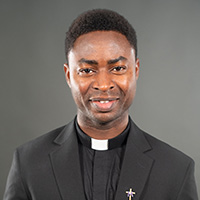 Father AmehCNH: What does it mean to you to become a pastor?
Father AmehCNH: What does it mean to you to become a pastor?
Father Ameh: When the letter came from the bishop that I was assigned as pastor to St. Joseph’s in Bryson City and a mission church at Cherokee, I was excited on the one hand, having been made a pastor, but on the other hand, I had no idea where Bryson City or Cherokee were – and what kind of people I was going to serve. A friend of mine, after looking it up on the internet, told me it was in the mountains. I was somewhat convinced that God has an interesting story to tell with me. Friends, I am not kidding you, it was a three-hour drive from where I was living at the time in Charlotte.
CNH: How have your earlier assignments helped you in your new role?
Father Ameh: I have worked as an associate to pastors who embody the spirit of dedication, passion for ministry and inspiration. From my years in the seminary and from the pastors I had earlier worked with, I had learned the role of a pastor is that of being all things to all people, as St. Paul rightly put it (1 Cor. 19:19-23). As administrator at Our Lady of the Assumption, many of the decisions about shepherding lay on my shoulders. Amazingly, that provided me with much opportunity for personal and professional growth.
CNH: How have your first few weeks as pastor been going?
Father Ameh: My first Sunday in church was deeply significant, as those who came to church wondered how I managed to speak good and clear English. I knew firsthand that I had inherited a very welcoming community. I received a warm welcome from the congregation, with members eager to introduce themselves, share their stories and to hear mine afterwards. Becoming part of this community and forming new relationships with the different families in the parish has been a source of inspiration, joy and support. Also, listening to the parishioners has been crucial. Understanding their needs, concerns and desires helped me build trust with the community. I intentionally used my first few weeks to learn about the church’s history, traditions and mission as a small unit within the collective body of the universal Church. Understanding the community’s needs and dynamics has been key in my ministry to them thus far.
CNH: What have you learned so far?
Father Ameh: I have learned the People of God are good everywhere and truly seek God with a sincere heart, irrespective of their race, background and social class. I have also created time within my weekly schedule for pastoral care for the sick in their homes and hospitals, providing members of my parish family with significant support in the Eucharist. I soon came to learn that ministry often requires adaptability – being prepared to adjust to plans and respond to unexpected challenges.
My role has required dedication, compassion and a commitment to serving Catholics and others within my parish geographical territory, Christians and non-Christians alike. Thanks to some of my parishioners who have been constructive in their feedback, I have been open to learning from both my successes and mistakes.
CNH: What challenges have you faced?
Father Ameh: Becoming a pastor has its own challenges. The first challenge that confronted me was trying to fit into the shoes of the previous pastor, who had worked passionately for and with the people for many years. I understand that my personality and style of shepherding may differ from his. Secondly, I am tasked with the responsibility of forming a parish council that can oversee the life and administration of the parish. Thirdly, because of our small size, the parish has no administrative personnel, so I have to be the pastor, secretary and catechist, to mention but a few roles. Nevertheless, I am optimistic that things will gradually fall in place as I look into the future with hope and with wonderful people here to give me all the helping hands I need.
CNH: Do you have a devotion to a particular saint that helps you with your ministry?
Father Ameh: I have developed a loving relationship with three saints who are very dear to my heart: Mary, Mother of God; St. Joseph; and St. John Paul II. Perhaps the reason for choosing the first two may be obvious, since both were guardians of Jesus – and my biological mother and father also go by these names. As a student under formation many years back in the seminary, I fell in love with St. John Paul II and his writings. His understanding of the priesthood and of personhood has greatly shaped who I have become today. He believed that the priesthood is a mystery, and that of service to God’s people, bringing the love and strength of Christ to them.
— Christina Lee Knauss


